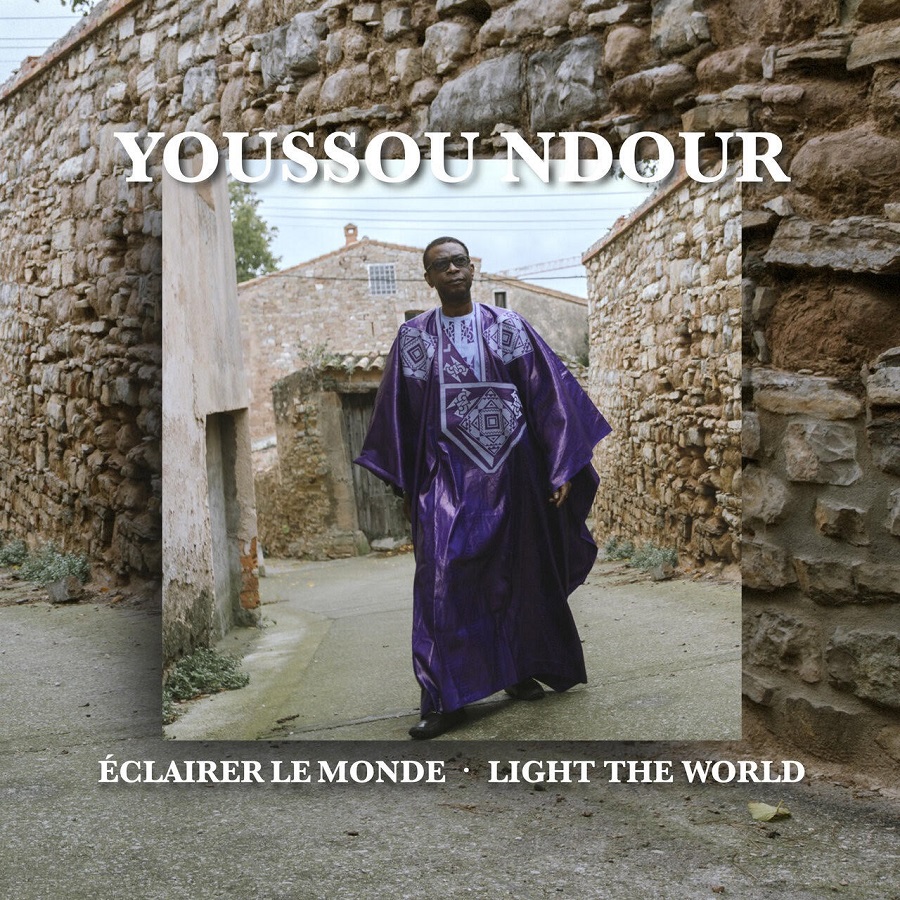Youssou N’Dour – Eclairer le monde
In the sun-drenched Catalan village of El Prats de Rei, nestled in the foothills of Montserrat, Youssou N’Dour has created what is meant to be his grand comeback. “Eclairer le monde” (Enlighten the World) emerged from the studio on the top floor of Michael League’s stone house, where the Senegalese superstar spent three weeks in what is described as an “industrious, family-like and gastronomic atmosphere.” The result is an album that shines with technical refinement but leaves you wondering what might have been if N’Dour had stayed closer to his roots.
To understand “Eclairer le monde,” one must come to terms with the complicated legacy of “7 Seconds.” As record producer Joe Boyd noted in his book ‘And the Roots of Rhythm Remain,’ one of N’Dour’s own band members once described this 1994 worldwide hit with Neneh Cherry as ‘the worst catastrophe that ever happened to Senegalese music.’ That assessment, though harsh, contains more than a kernel of truth.
Before “7 Seconds” catapulted him to mainstream Western recognition, N’Dour was already known as the ‘Nightingale of Dakar,’ the undisputed king of mbalax—that electrifying fusion of traditional griot storytelling, frenetic percussion, and Afro-Cuban arrangements. His breakthrough in 1984 with “Immigrés” and his work with Super Étoile de Dakar represented something authentic, vibrant, and unmistakably Senegalese. The raw energy was almost too much for Western listeners to process, but that was precisely its strength.
Success changed the equation. Collaborations with Peter Gabriel, Western producers, and a parade of international stars gradually pushed N’Dour toward a more polished, accessible sound. The pursuit of crossover success came with artistic compromises that have haunted his international releases for decades, while his local Senegalese output retained more of his original fire.
A notable absence hangs like a shadow over “Eclairer le monde”: Jimi Mbaye, the brilliant guitarist whose distinctive playing helped define the sound of Super Étoile de Dakar, who recently passed away. In his place, we find N’Dour’s longtime guitarist Tapha Gaye sharing space with producer Michael League (co-founder of Snarky Puppy), who handles bass, guitars, ukulele, and keyboards.
The album’s supporting cast spans continents—drummer Munir Zakee from Atlanta, pianist Frank Locrasto from New York, kora player Momi Maiga from Madrid—alongside N’Dour’s faithful percussionists Mbaye Dieye Faye and Thio Mbaye. This global collection of talent delivers impeccable musicianship, but sometimes at the cost of cohesion.
“Tout Pour Briller” opens the album with a promising burst of talking drum and percussion reminiscent of the N’Dour who once dominated Parisian taxi radios in the 1980s. This driving energy briefly returns in “Sa Ma Habiibi,” a feminist statement against forced marriages carried by an “insistent cadence” that feels authentically anchored in mbalax rhythms.
“Sam Fall,” a tribute to the Islamic Baye Fall sect, achieves a delicate balance between tradition and innovation as League’s acoustic guitar interweaves with Tapha Gaye’s playing. Here, the fusion feels organic rather than forced.
But then there’s “On L’a Fait,” a football anthem with N’Dour’s son Nelson and daughter Rema Diop. Despite beautiful background vocals and exotic ngoni embellishments, the track embodies the broader problem with the album—it’s a hodgepodge of disparate elements that never truly coalesce. One can’t escape the impression that this has become more of a ‘Michael League plays African music’ album than a showcase for the king of mbalax.
“Eclairer le monde” reflects a pattern all too common among world music stars from Africa. In the quest for the elusive international breakthrough, artistic control is often transferred to Western producers who, despite their talents and good intentions, inevitably reshape the music through their own cultural lens.
N’Dour’s dilemma is particularly poignant because his commercial peak came 31 years ago with “7 Seconds.” His last internationally successful album, “Dakar-Kingston,” dates back to 2011, and for his last truly great album, many critics would point to the masterful “Egypt” from 2004, an album that, notably, embraced N’Dour’s Islamic spirituality rather than chasing Western pop formulas.
The true tragedy of “Eclairer le monde” is not that it’s a bad album—it isn’t. The musicianship is exemplary, the production impeccable, and N’Dour’s voice remains a wonder at age 65. But after a 45-year career, gold records, a Grammy Award for “Egypt,” and honorary doctorates from Yale (2011) and Berklee Valencia (2024), one would wish for more than mere competence.
The N’Dour who once illuminated Dakar with the pure, uncompromising energy of mbalax appears here only in glimpses. What remains is a carefully crafted approximation—competent but safe, international but inevitably diluted. “Eclairer le monde” may enlighten some corners of the world, but it casts long shadows over what might have been if the Nightingale of Dakar had been allowed to sing his own song, in his own way.
For those seeking the true essence of Youssou N’Dour, one would be better served by exploring his extensive back catalog, particularly his early work with Super Étoile de Dakar or even his local Senegalese releases that never made the crossing to Western markets. There, the light burns brightest of all. (7/10) (Youssou Ndour/TBI Publishing)





